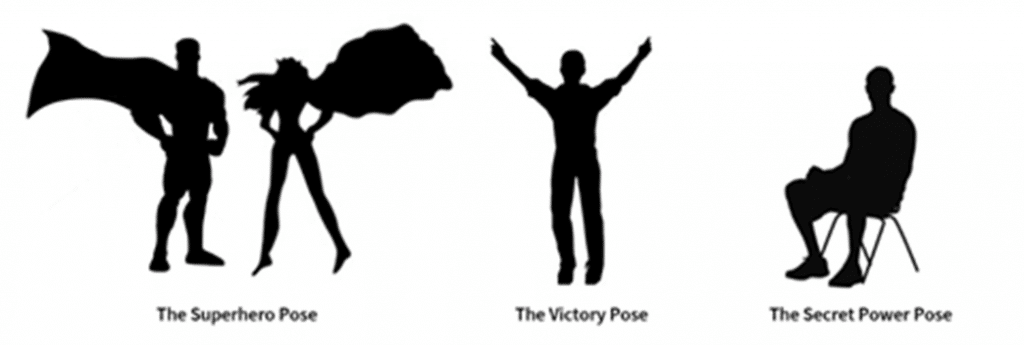It’s completely normal to be nervous before a job interview – we’ve all been there! In most job interviews, the power dynamic is in favour of the employer. Her or his evaluation of your performance is very important, as she or he has the power to make decisions that will directly impact your future career.
What if we told you there’s a simple trick that may boost your confidence before you go into an interview for your dream job, and all it takes is two minutes of your time?
High-power vs. low-power poses
In the moments leading up to and during a job interview, candidates can experience anxiety, feeling nervous or jittery. As a result, candidates can experience apprehension about their performance leading up to the interview, which influences their bodies to close off and produce low-power postures, such as crossing their arms or hunching their shoulders. Not only do these closed and contractive postures reflect a person’s low-power status, they reinforce this.
Conversely, high-power is expressed through open and expansive postures. A 2010 study found that adopting high-power nonverbal poses caused participants to experience decreased levels of cortisol (the body’s primary stress hormone) and increased levels of testosterone (a hormone associated with dominance). Furthermore, participants who adopted high-power poses experienced elevated feelings of power and performed better in mock interviews than their counterparts who sat in low-power poses!
High-power poses to try
Ready to give it a go? We’ve picked out a few of our favourite power poses to try out before your next interview. Pick two poses and try each of them for 60 seconds each.
- The Superhero Pose: This is the most popular power pose. Place your hands on your hips, set your legs shoulder width apart, lift your chest and hold your head up high with your chin tilted.
- The Victory Pose: Plant your feet wide, raise your arms above your head to resemble a giant V, and hold your head high.
- The Secret Power Pose: Worried other people are able to see you in the waiting room? Try this instead! Place your hands on your knees (if sitting) or plant your feet shoulder width apart (if standing), straighten your back, puff out your chest and lift your chin.

Other uses for high-power poses
Once you land that amazing job, the power posing doesn’t have to stop! You can use these poses to boost your confidence and in turn improve your performance in the lead-up to an important meeting with your boss, or before a presentation in front of your colleagues.
Want to learn more?
We’ve included some references on power poses below.
If you’d like to discuss how to ace your next interview, get in touch.
Stephanie Gill
Client Solutions Manager | relatbl
+61 451 081 142
stephanie.gill@relatbl.com.au
Brydie Murphy
Client Solutions Consultant | relatbl
+61 403 182 772
brydie.murphy@relatbl.com.au
References
Carney, D., Cuddy, A., & Yap, A. (2010). Power Posing. Psychological Science, 21(10), 1363-1368. doi: 10.1177/0956797610383437.
Fischer, J., Fischer, P., Englich, B., Aydin, N., & Frey, D. (2011). Empower my decisions: The effects of power gestures on confirmatory information processing. Journal of Experimental Social Psychology, 47(6), 1146-1154. doi: 10.1016/j.jesp.2011.06.008.
Guinote, A. (2007). Power and Goal Pursuit. Personality and Social Psychology Bulletin, 33(8), 1076-
1087. doi: 10.1177/0146167207301011.
Heimberg, R. G., Keller, K. E., & Peca-Baker, T. (1986). Cognitive assessment of social-evaluative anxiety in the job interview: Job interview self-statement schedule. Journal of Counselling Psychology, 33, 190–195.
Navarro, J., & Karlins, M. (2015). What every BODY is saying. New York, NY: Harper Collins.
Park, L., Streamer, L., Huang, L., & Galinsky, A. (2013). Stand tall, but don’t put your feet up: Universal and culturally-specific effects of expansive postures on power. Journal of Experimental Social Psychology, 49(6), 965-971. doi: 10.1016/j.jesp.2013.06.001.
Ranehill, E., Dreber, A., Johannesson, M., Leiberg, S., Sul, S., & Weber, R. (2015). Assessing the Robustness of Power Posing. Psychological Science, 26(5), 653-656. doi: 10.1177/0956797614553946.





Leave A Reply